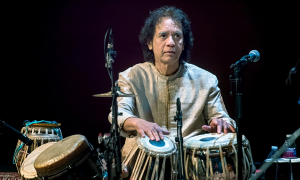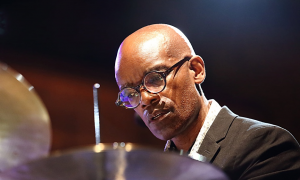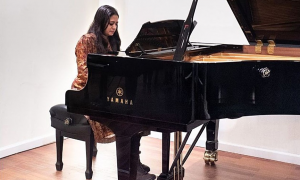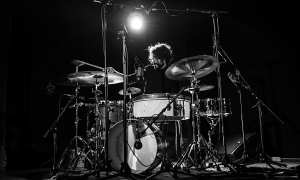Home » Jazz Articles » Under the Radar » Invisible Man: Willis Conover and The Jazz Hour
Invisible Man: Willis Conover and The Jazz Hour

Jazz is a classical parallel to our American political and social system. We agree in advance on the lawsЎӯwe are free to do whatever we wish within those constraints. ItЎҜs the same with jazz.
—Willis Conover
The Voice of America
To understand the anonymity of Conover, in his own country, it is necessary to recognize the clandestine operations of the Voice of America. When the stars aligned, the VOA was embraced in a bipartisan manner. When there was any question of the organization's effectiveness, Washington bureaucrats treated it as a political football, both sides of the aisle lining up to kick it as far from themselves as possible. In 1939, the United States was the only world power without a government-subsidized radio service, with some degree of global reach. It was that year when Germany invaded Poland setting World War II in motion; the Nazi regime already having a large network of radio transmitters broadcasting into other parts of Europe and into Latin America. Japan, now at war with China, had a similar propaganda apparatus in place while the Dutch, English, French, and Soviets had been broadcasting radio propaganda since the beginning of the decade, the USSR, in fifty languages. Legislation for a national radio service had been introduced—and failed to pass in Congress—in 1937, 1938 and 1939 despite the concerns of many elected officials that saw the need to counter Nazi propaganda. President Franklin D. Roosevelt established the U.S. Foreign Information Service (FIS) broadcasting from New York City and bringing in seasoned journalists and producers. But the lack of a supporting government infrastructure was near crippling. Shortwave radio was the means of broadcasting for all the industrialized countries with propaganda programming and those countries developed government-run networks to disseminate programs. FIS had to rely on U.S.-based amateur radio operators. Shortwave radio kits were inexpensive and relatively easy to build and by the early 1920s, there were sufficient numbers in use to warrant licensing regulations. By 1924, amateur operators in the U.S. were broadcasting as far away as New Zealand. FIS recruited both amateurs and professionals in the U.S. and worked with BBC officials in London to bring about off-shore programming, including Voice of America broadcasts that began concurrently with the 1941 U.S. entry into the war.The numerous government agencies under whose umbrellas the VOA resided, prohibited the programs from being broadcast inside the U.S. either live or on tape and critics of the VOA questioned what "truths" were being broadcast on the taxpayer's dollar. Government officials offered what seems a self-defeating explanation, saying "programming used to promote American interests abroad could amount to domestic propaganda if shown within the United States." The ban on U.S. broadcasts remained in effect for over seventy years, being lifted in 2013 when the internet had made such injunctions useless.
The VOA, in 1953, came under the scrutiny of the infamous Senator Joseph McCarthy. McCarthyism found targets everywhere, many singled out for support of reforms such as child labor laws, women's rights and vaccines—all seen as communist apparatuses. Because the entertainment industry was seen as a sector particularly "soft" on communism, the VOA became an extension of those suspicions. Among the accused communist sympathizers in the music world were Alan Lomax, Paul Robeson, Leonard Bernstein, Pete Seeger, Aaron Copland, Harry Belafonte, Lena Horne, clarinetist Artie Shaw, and pianist Hazel Scott, all of whom were blacklisted. Terence Ripmaster writes in Willis Conover: Broadcasting Jazz to the World (iUniverse, 2007) that McCarthy—among his multiple VOA accusations, identified Raymond Kaplan, an engineer at the network. Kaplan was notified that he may be called to testify for his part in the VOA plan to build a transmitter near Seattle. The McCarthy committee was suspicious there was a nefarious reason behind the Pacific Northwest location, such as its close proximity to Russia. Kaplan wrote to his wife "Once the dogs are set on you, everything you've done since the beginning of time is suspect." He did not wait to be called, throwing himself in front of an oncoming truck in Cambridge, Massachusetts.
In the wake of the McCarthy hearings, the VOA was left devasted. Congress cut their 1954 funding from twenty-two million dollars to sixteen million. Individual VOA programs were rarely the targets of investigation but Ripmaster suggests that the Jazz Hour was irritating to VOA critics because the program's public image was dominated by the likes of

Louis Armstrong
trumpet and vocals1901 - 1971

Duke Ellington
piano1899 - 1974

Count Basie
piano1904 - 1984
The Voice
Conover was born into a military family in Buffalo, N.Y. in 1920 and attended dozens of different schools as the family moved around the country. As a result of an extended correspondence with the science fiction writer H.P. Lovecraft, he became an editor the Science Fantasy Correspondent, a 1937 magazine. At fourteen he was given the part of a radio announcer in a high school play. The resonant baritone he would become known for was developing in 1939, and as a college student in Salisbury, Maryland and took his first paying job as a radio announcer at WSAL. He was later offered a job at WTBO in Cumberland, Maryland, after winning an announcer contest. Conover had shown little interest in music, and none in jazz when he inadvertently came in contact with a recording of Charlie Barnet's "Cherokee"; that encounter shaped his life. Now an active explorer of record store jazz sections, he became a disciple of Ellington who later became a close friend. A stint in the army again found him behind the microphone, due to his extreme nearsightedness. Following his time in the service, Conover landed an announcer position at WWDC, then in downtown Washington, D.C. and hosted the daily broadcast of The Tune Shop. Maristella Feustle's Willis Conover's Washington" (Current Research in Jazz 8, 2016) notes that the Voice of America network knew of Conover years before he went to work there, even rebroadcasting some of his WWDC programs. She cites The Washington Post of September 4, 1949, writing "Willis Conover, WWDC expert on swing and jazz, is...traveling with Duke Ellington's orchestra during the next two weeks, to add to his knowledge of jazz lore." Conover became so inextricably linked to the music he played that otherwise knowledgeable sources leapt to conclusions. One record label initially sought to bill him a bandleader, and Billboard Magazine (December 15, 1951) wrote: "Willis Conover, WWDC, is now fronting a 17-piece modern jazz ork, in addition to his regular radio and TV show." Conover was not a musician, and his associations with jazz musicians came from his contacts as a disc jockey, host/emcee, producer, narrator, and interviewer.Conover's Jazz Hour was not the first jazz program on VOC but only Leonard Feather's Jazz Club USA (1950-1952) was a moderate success. Feather typically played swing and traditional, but on rare occasions put on a

Charlie Parker
saxophone, alto1920 - 1955

Bud Powell
piano1924 - 1966
Along with playing records, the Jazz Hour featured interviews and live performances from artists including

Chet Baker
trumpet and vocals1929 - 1988

Art Tatum
piano1909 - 1956

Dizzy Gillespie
trumpet1917 - 1993

Louis Armstrong
trumpet and vocals1901 - 1971

Bobby Hackett
trumpet1915 - 1976

Johnny Hodges
saxophone, alto1907 - 1970

John Lewis
piano1920 - 2001

Gene Krupa
drums1909 - 1973

Buddy Rich
drums1917 - 1987

Marian McPartland
piano1918 - 2013

Benny Goodman
clarinet1909 - 1986

Gil Evans
composer / conductor1912 - 1988

Woody Herman
band / ensemble / orchestra1913 - 1987

Nat King Cole
piano and vocals1919 - 1965

Dave Brubeck
piano1920 - 2012

Niels-Henning Orsted Pedersen
bass1946 - 2005

Sarah Vaughan
vocals1924 - 1990

Ella Fitzgerald
vocals1917 - 1996
As Conover's popularity grew overseas so did the demand for in-person appearances in key countries. In Poland, in 1959, he was greeted by banners and a large crowd of fans as he disembarked from his plane and he was treated as a celebrity in Moscow. He traveled throughout Eastern Europe, parts of Western Asia, the Middle East, North Africa, and Latin America, representing the VOA and the Jazz Hour. While Conover kept politics out of his program, the same wasn't always true in his travels. In the paper Liberated from Serfdom Maristella Feustle describes a confrontation with a listener in Prague:
Listener: "Why did you come here?"
Conover: "I told you. To say hello and listen to your music. You think I'm here for political reasons?"
Listener: "Everything is political."
Conover: "What do you mean? Are you saying that when Soviet dance troupes and concert pianists come to America, they've been sent by Russia for political reasons?"
Listener: "Everything is political...The fact that your music program is broadcast on the Voice of America makes it a political program."
By the late 1960s the success of Jazz Hour was a central influence in the extension of the VOA platform to launch similar programs that featured pop music. But even as the popularity of jazz was declining in the U.S., Conover's jazz show would continue to grow in popularity for decades, and in more global markets. Despite the accomplishments of the Jazz Hour there were those in VOA management that suggested tinkering with the format. In 1989 Conover told interviewer Cliff Groce that changing the program to an all-talk format had been suggested. Another manager wanted to capitalize on the "British Invasion" by mixing bands like the Beatles and Rolling Stones into the rotation. Conover was a harsh critic of pop music however, telling Groce that pop was ..."cheap, broadly appealing, shallow...I aim for a relatively narrower, deeper and taller audience." Capable of being self-aggrandizing, Conover told the jazz writer Don DeMichael he did not tolerate management interference and that "he was the sole arbiter, based on his appointment as the person best suited for the position." Conover played recordings almost exclusively from his own record collection and he selected the program's interview guests. He was outspoken about his playlist choices. In the Groce interview Conover said he avoided playing

Miles Davis
trumpet1926 - 1991
Beyond the Jazz Hour
In 1971, the opening year of the Kennedy Center for the Performing Arts, Conover was signed on as the center's jazz consultant. He told the Washington Evening Star writer, Gwen Dobson, he saw it as his calling to raise the reputation of jazz music "to its deserved place of prominence as 'America's classical music.'" His vison was not universally accepted. A few days later the Washington Post columnist Hollie West documented unrest among the Kennedy Center's jazz panel: "The panel grew increasingly frustrated, wondering if Conover was the right person for the job. There were several facets of Conover's role to be considered: his race, tastes, intent and his blind (and deaf) spots... Many were troubled by the sight of a singular white jazz promoter and spokesperson to multiple federal institutions. Calling Conover 'almost the czar of resources for jazz on a federal level' panel member and former jazz bassist Julian Euell spelled out his concerns to West: "My major objection to Willis Conover is not personal. But I think it's poor judgement to have a white guy in that job. It's following the old pattern of whites controlling and making the profits from the music." Despite objections, the jazz segments of the festivities were left in Conover's hands. West described the Conover contribution as "a creaky vessel drifting into harbor [rather] than a christening of jazz at a new culture center." She asked why a "cultural showcase" included not a single person of color in its management, and described Conover as "self-serving." The Washington Evening Star's Larry Barrett, in the article R.I.P. (and About Time) for 'House of Sounds' (Sept 27, 1971, B6.) noted that the mainstream entertainment, including the advertised talents of
Muddy Waters
guitar1915 - 1983

Buddy Rich
drums1917 - 1987

Clark Terry
trumpet1920 - 2015
Legacy
Numerous sources have credited Conover's Jazz Hour as a significant factor in ending the Cold War. Those sources are anecdotal. In the 1980s the Soviet economy was in shambles; the military was bleeding resources in an endless conflict in Afghanistan; Iron Curtain countries were rebelling without pushback from Moscow. Jazz music was probably a symbolic—if somewhat misplaced— avatar of Western equality but beyond that, we will never know how impactful it was as a change agent. Testimonials from musicians all over the globe validate the effect that Conover and the Jazz Hour had in bringing uniquely American music to oppressed countries when such entertainment was viewed as the essence of Western decadence. The reception to his appearances in Poland, Russia, Brazil, and India were on a par with those of the most popular Jazz Ambassadors and there was never a doubt that Conover gave complete allegiance to the cause of the VOA. Ripmaster reports that a 1970s survey showed that—among Soviets—familiarity with Conover was second only to Richard Nixon and John Chancellor, a Director at the VOA who went on to fame as a news anchor at NBC, believed that Conover's program was the most effective propaganda tool that the organization had. But for many in Washington D.C., there were troubling aspects of his personality. Sporadically at odds with VOA management, he was not above programming his preferred music over management objections. His personal life was messy, with five divorces and serious financial troubles. His insistence on being a contract worker rather than a government employee cost him his medical benefits. A heavy smoker, he died from lung cancer in 1996. Several failed efforts have since been made to have the U.S. Postal Service issue a commemorative stamp and to award Conover the Medal of Freedom. A VOC tribute concert in 2007 featured Cuban saxophonist
Paquito D'Rivera
clarinetb.1948

Milcho Leviev
pianob.1937

Jan Hammer
keyboardsb.1948

George Mraz
bass1944 - 2021
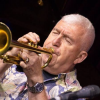
Valery Ponomarev
trumpetb.1943
After Conover's death, CBS commentator Charles Osgood said that it was probably an exaggeration to say that the music of the Jazz Hour brought about the end of the Cold War, but that after the decades of jazz "the walls did come tumbling down." Polish pianist

Adam Makowicz
pianob.1940

Art Farmer
flugelhorn1928 - 1999
Discography
 The Willis Conover House of Sound
The Willis Conover House of Sound (Brunswick, 1953)
Willis Conover's sole album "credit" is an oddity in numerous ways. While he was later known by many U.S. musicians for his work with the Voice of America Jazz Hour, this album was recorded when his sphere of influence was confined to the WWDC listening area in and around Washington, D.C. Conover neither performed (he was not a musician) or produced the project, but simply announced the band at the beginning of Side A. Conover did select the musicians (hence, the billing) and chose the playlist. Known for his staunch support and activism in integrating jazz venues and bands, he nevertheless assembled an entire orchestra of white players from all-white bands. The music is old-school swing and even for the early 1950s, it's past its prime. Intended or not, House of Sound plays out like a tribute to the familiar styles of

Woody Herman
band / ensemble / orchestra1913 - 1987

Stan Kenton
piano1911 - 1979
Personnel: Bob Carey, Ed Leddy, Marky Markowitz, Charlie Walp: trumpets; Dan Spiker, Earl Swope, Rob Swope: trombones; Jim Riley: alto saxophone; Ben Lary, Jim Parker, Angelo Tompros: tenor saxophone; Jack Nimitz: baritone saxophone; Jack Holliday: piano; Merton Oliver: bass; Joe Theimer: drums, conductor; Bill Potts: arranger.
Tracks: Side A: 1 I've Got You Under My Skin; One For Kenny; The Song Is You; Pill Box; Light Green; Flamingo. Side B: Something to Remember You by/Taking a Change on Love/Blue Room; Sheriff Crane [AKA Jack Pot County]; Playground; Tiger; Moonlight in Vermont; Willis.
References:
- The New York Times, p. 35, May 19, 1996, "Willis Conover, 75, Voice of America Disc Jockey," by Robert McG. Thomas Jr
- VOA Public Relations
- Feustle, Maristella. "Willis Conover's Washington." Current Research in Jazz 8, (2016).
- Broadcasting & Telecasting
- Breckenbridge, Mark. Sounds for Adventurous Listeners: Willis Conover, The Voice of America, and the International Reception of Avant-Garde Jazz in the 1960s. University of North Texas, August 2012
- Library of Congress 1989 Interview with Mr. Willis Conover
- https://www.newsweek.com/dj-who-shook-soviet-union-jazz-360935
- Dobson, Gwen. "Non-Playing Mr. Jazz: World Is His Audience." The Evening Star, Sept 24, 1971, E1.
- West, Hollie. "Jazz Discord: Issue in Black and White: Jazz Consultant Discord: Should Willis Conover Stay?" The Washington Post, Sep 19, 1971, G1.
- RЁ№diger Ritter (2013) Broadcasting Jazz into the Eastern Bloc—Cold War Weapon or Cultural Exchange? The Example of Willis Conover, Jazz Perspectives, 7:2, 111-131
Tags
Comments
PREVIOUS / NEXT
Support All About Jazz
 All About Jazz has been a pillar of jazz since 1995, championing it as an art form and, more importantly, supporting the musicians who make it. Our enduring commitment has made "AAJ" one of the most culturally important websites of its kind, read by hundreds of thousands of fans, musicians and industry figures every month.
All About Jazz has been a pillar of jazz since 1995, championing it as an art form and, more importantly, supporting the musicians who make it. Our enduring commitment has made "AAJ" one of the most culturally important websites of its kind, read by hundreds of thousands of fans, musicians and industry figures every month.







 Buy Now
Buy Now




